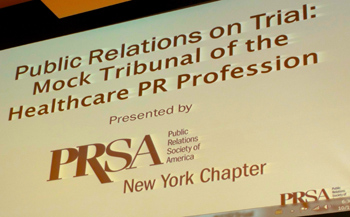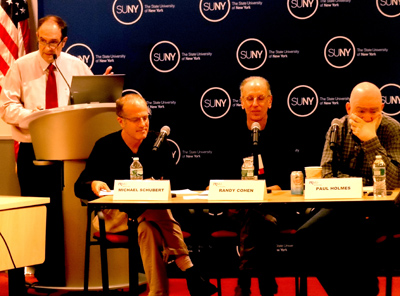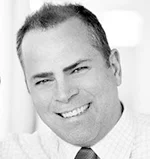|
|
At SUNY's Global Center in New York earlier this week a mock trial was held to determine whether healthcare PR is "deceptive, non-transparent and of little value to clients or society."
If it were a real trial, the PR profession would be facing severe financial penalties—and maybe even some jail time.
Paul Holmes, editor of Holmes Report, served as prosecutor, while Michael Schubert, Ruder Finn's chief innovation officer, countered as defense attorney.
Randy Cohen, who wrote the New York Times "The Ethicist" column, was the judge.
Holmes started the proceedings by lashing into healthcare PR practitioners. “Patients and consumers have a right to be educated and companies have an absolute right to educate them,” he said. “What they don’t have a right to do is step over the line between education and promotion.”
Holmes said the problems associated with healthcare PR are myriad and that PR pros are essentially wards of the healthcare industry rather than legitimate counselors.
For starters, the drug and healthcare industries tend to rely on celebrity spokespeople, who are not medical professionals and are not beholden to questions about what precisely they are selling to the public.
 What is more, the aforementioned industries fail to focus on preventive medicine and how to improve healthcare and instead squeeze consumers on “imagined” medical problems and “lifestyle” drugs such as Viagra, Holmes said. “The patient is not at the center of marketing communications,” he said.
What is more, the aforementioned industries fail to focus on preventive medicine and how to improve healthcare and instead squeeze consumers on “imagined” medical problems and “lifestyle” drugs such as Viagra, Holmes said. “The patient is not at the center of marketing communications,” he said.
Holmes also stressed that as drug costs have grown in the last ten to fifteen years, the pharmaceutical industry has spent roughly $3 billion on lobbying efforts.
Schubert acknowledged that the healthcare PR profession may have some flaws but it acts in an open and transparent fashion.
“We’re in the business of helping and saving lives and not destroying lives,” he said. “People I know in the PR business chose this field because they want to do something that makes a difference in people’s lives.”
He added: “It’s not that there aren’t rogue salesman or [healthcare] CEOs who are really hedge fund managers with outrageous pricing. But you have an industry that’s selling a difference in people’s lives and whenever there is a medical benefit, there is a risk.”
Lisa Stewart Hughes, VP, deputy chief compliance officer, NBCUniversal Inc., who was a ”witness” for the prosecution, stressed that, for PR pros who work in healthcare, “Hope is not enough. You have to take a step back before you put out information that may be one-sided.”
She added that healthcare PR pros have an extra responsibility to act ethically. “You must, ‘do no harm,’” she said, “regardless of whether you are a doctor, a nurse or work for the industry.”



 Lo Isidro, senior director at Real Chemistry with more than a decade of strategic communications and PA experience, has joined Narrative Strategies.
Lo Isidro, senior director at Real Chemistry with more than a decade of strategic communications and PA experience, has joined Narrative Strategies. Nelson Fernandez, former North American chair of APCO Worldwide and managing director of Burson-Marsteller, has joined Volunteers in Medicine Berkshires as director of communications and PA.
Nelson Fernandez, former North American chair of APCO Worldwide and managing director of Burson-Marsteller, has joined Volunteers in Medicine Berkshires as director of communications and PA. Lilit Bargar, who was most recently an EVP in the healthcare practice at Weber Shandwick, comes on board at GCI Health as EVP, corporate practice lead.
Lilit Bargar, who was most recently an EVP in the healthcare practice at Weber Shandwick, comes on board at GCI Health as EVP, corporate practice lead.
 Five ways that successful thought leaders are made.
Five ways that successful thought leaders are made.


 Have a comment? Send it to
Have a comment? Send it to 
No comments have been submitted for this story yet.